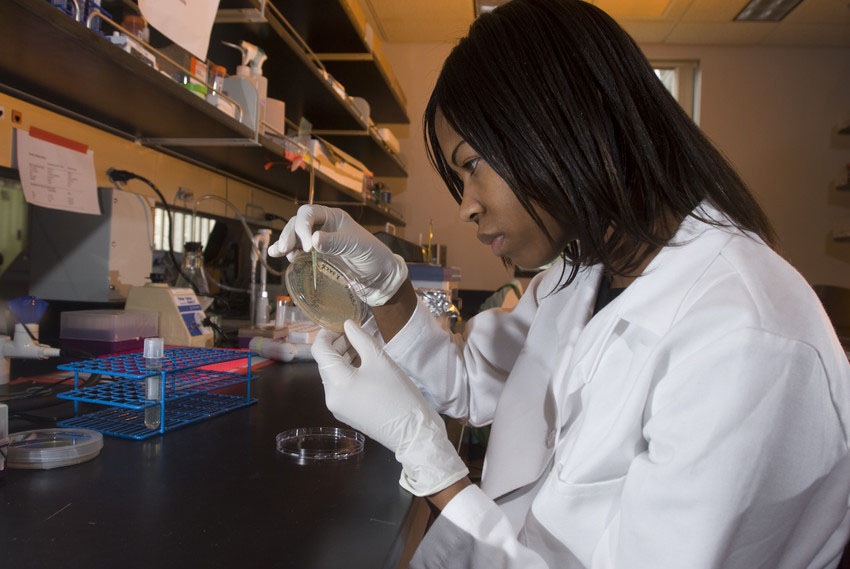New doctoral program lauded by leading association of medical colleges for research-focused training

A new graduate program at Virginia Tech is garnering national acclaim, and it hasn’t even enrolled its first student yet.
The Association of American Medical Colleges (AAMC) today announced the recipients of its second annual Award for Innovative Institutional Partnerships in Research and Research-focused Training.
Out of 35 national submissions, Virginia Tech’s new doctor of philosophy degree program in Translational Biology, Medicine, and Health was a semi-finalist, reaching the top four of an elite, competitive field.
“Being recognized by the mother ship organization for all academic medical centers, medical schools, and teaching hospitals in the United States reflects just how hard everyone has worked to tie together the many strengths of Virginia Tech to train translational researchers who can accelerate the transformation of fundamental biological discoveries into new approaches to prevent, diagnose, treat, and cure disease,” said Michael Friedlander, associate provost for health sciences at Virginia Tech, who will oversee the new program.
“Being recognized along with more established graduate programs from institutions including the University of California at San Francisco, the University of Wisconsin-Madison, the University of California at Davis, and Tufts University also is indicative of the strengths and importance of this new doctoral program.”
The AAMC has represented all American and Canadian medical schools for more than 135 years and currently comprises 128,000 faculty members, 75,000 medical students, and 110,000 resident physicians.
In support of its recent call for innovative interdisciplinary and translational programs to train the next generation of leaders in biomedical science, the AAMC created the award last year to identify bright spots and disseminate innovations that create and sustain institutional partnerships in research and research-focused training.
Virginia Tech’s new program fits these goals by partnering seven colleges and 17 departments across the university to develop six tracks of study: cancer; development, aging, and repair; health implementation science; immunity and infectious disease; metabolism and cardiovascular science; and neuroscience.
In June, the Virginia Tech Board of Visitors approved a resolution to create the program.
“Virginia Tech is harnessing the brightest cross-disciplinary faculty and students to tackle the challenges of health care, research, and technology transfer in Virginia and the world,” said Mark G. McNamee, senior vice president and provost. “Our vision for a new approach to train biomedical and health scientists emerged from the university’s most recent strategic plan, A Plan for a New Horizon, with support from the Board of Visitors. It is highly encouraging that our strategy resonates with the thought leaders of academic health centers and medical schools.”
Friedlander and program director Audra Van Wart created the proposal and submitted it to the AAMC.
“The doctoral program is expected to matriculate its first class of students in the fall of 2014, pending approval by the State Council of Higher Education for Virginia, or SCHEV,” Van Wart said.
Formal course instruction will take place at Virginia Tech’s Blacksburg and Roanoke facilities, with some use of interactive videoconferencing capabilities. Students from diverse educational backgrounds — including physical and life sciences, engineering, computation, and behavioral and social sciences — will work together to learn about health and disease processes, using case presentations to understand the full complexity of health challenges.
The award was developed with the AAMC’s Graduate Research, Education, and Training (GREAT) Group and its Group on Research Advancement and Development (GRAND) leadership. GREAT links faculty and administrative leaders of biomedical doctoral, M.D.-Ph.D., and postdoctoral programs. GRAND leadership is the professional development group for research deans, deans of clinical research, and other research leaders at academic medical centers.
The award will be presented at the GREAT Group Annual Professional Development Meeting in Atlanta on Sept. 20.
Dedicated to its motto, Ut Prosim (That I May Serve), Virginia Tech takes a hands-on, engaging approach to education, preparing scholars to be leaders in their fields and communities. As the commonwealth’s most comprehensive university and its leading research institution, Virginia Tech offers 240 undergraduate and graduate degree programs to more than 31,000 students and manages a research portfolio of $513 million. The university fulfills its land-grant mission of transforming knowledge to practice through technological leadership and by fueling economic growth and job creation locally, regionally, and across Virginia.




